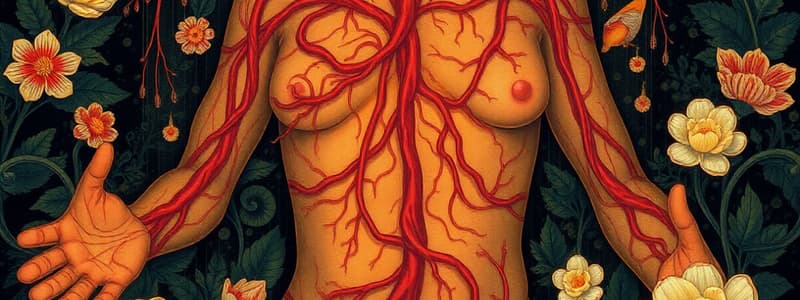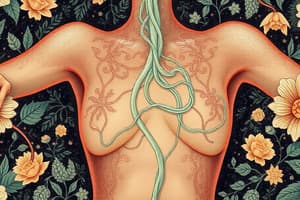Podcast
Questions and Answers
Water accounts for up to 60% of live human body weight. What is the largest reservoir of body water?
Water accounts for up to 60% of live human body weight. What is the largest reservoir of body water?
- Cardiovascular system (correct)
- Cells
- Digestive tract
- Urinary bladder
Why are the extracellular and intracellular fluids referred to as 'fluid compartments'?
Why are the extracellular and intracellular fluids referred to as 'fluid compartments'?
- They can be regulated independently of each other.
- They are in communication but can maintain different internal compositions. (correct)
- Because they receive water from different sources.
- They are separated by specific structural boundaries. (correct)
The movement of the fluid in the capillary bed is the result of:
The movement of the fluid in the capillary bed is the result of:
- Osmotic pressure
- The electrochemical gradient
- Hydrostatic pressure
- Osmotic and hydrostatic pressure (correct)
Which is the best definition of osmotic pressure?
Which is the best definition of osmotic pressure?
Water that filters from the capillaries into the interstitial fluid...
Water that filters from the capillaries into the interstitial fluid...
The extracellular (ECF) and intracellular fluids (ICF) are in osmotic equilibrium. This implies all of the following, EXCEPT:
The extracellular (ECF) and intracellular fluids (ICF) are in osmotic equilibrium. This implies all of the following, EXCEPT:
Which of the following can be directly measured?
Which of the following can be directly measured?
What is the role of the hypothalamus in regulating water balance?
What is the role of the hypothalamus in regulating water balance?
Dehydration (water depletion) and water intoxication (excess water intake) have the most direct effect on the extracellular fluid concentration of which ion?
Dehydration (water depletion) and water intoxication (excess water intake) have the most direct effect on the extracellular fluid concentration of which ion?
What constitutes an effective buffer?
What constitutes an effective buffer?
Which ion plays a major part in haemostasis (blood clotting)?
Which ion plays a major part in haemostasis (blood clotting)?
Which physiological factor initiates haemostasis?
Which physiological factor initiates haemostasis?
What it is the consequence of platelet activation?
What it is the consequence of platelet activation?
Why does whole blood in the intact circulatory system not clot?
Why does whole blood in the intact circulatory system not clot?
Clotting disorders cause:
Clotting disorders cause:
Which of the following is NOT part of the NON-SPECIFIC immune defenses?
Which of the following is NOT part of the NON-SPECIFIC immune defenses?
Innate immunity is:
Innate immunity is:
Immunity can be acquired by all of the following ways EXCEPT:
Immunity can be acquired by all of the following ways EXCEPT:
All of the following are part of the first line of defense against invaders EXCEPT:
All of the following are part of the first line of defense against invaders EXCEPT:
Allergy involves an excessive immune response against:
Allergy involves an excessive immune response against:
Flashcards
What is the largest reservoir of body water?
What is the largest reservoir of body water?
The largest reservoir of body water is the intracellular fluid (ICF), which is the fluid inside cells. It accounts for approximately 60% of total body water.
Why are extracellular and intracellular fluids called 'fluid compartments'?
Why are extracellular and intracellular fluids called 'fluid compartments'?
Extracellular and intracellular fluids are referred to as 'fluid compartments' because they are separated by cell membranes and maintain different internal compositions.
What determines the fluid movement in the capillary bed?
What determines the fluid movement in the capillary bed?
Fluid movement in the capillary bed is determined by a combination of osmotic and hydrostatic pressures. Osmotic pressure pulls fluid into the capillaries, while hydrostatic pressure pushes fluid out.
What is osmotic pressure?
What is osmotic pressure?
Signup and view all the flashcards
What happens to water that filters from capillaries into the interstitial fluid?
What happens to water that filters from capillaries into the interstitial fluid?
Signup and view all the flashcards
What does osmotic equilibrium between the ECF and ICF imply?
What does osmotic equilibrium between the ECF and ICF imply?
Signup and view all the flashcards
Which fluid compartments can be directly measured?
Which fluid compartments can be directly measured?
Signup and view all the flashcards
How does the hypothalamus regulate water balance?
How does the hypothalamus regulate water balance?
Signup and view all the flashcards
Which ion is most directly affected by dehydration and water intoxication?
Which ion is most directly affected by dehydration and water intoxication?
Signup and view all the flashcards
What is the role of a buffer?
What is the role of a buffer?
Signup and view all the flashcards
Which ion is important for blood clotting?
Which ion is important for blood clotting?
Signup and view all the flashcards
What triggers the blood clotting cascade?
What triggers the blood clotting cascade?
Signup and view all the flashcards
What is the consequence of platelet activation?
What is the consequence of platelet activation?
Signup and view all the flashcards
Why doesn't whole blood clot in the circulatory system?
Why doesn't whole blood clot in the circulatory system?
Signup and view all the flashcards
What is the consequence of a clotting disorder?
What is the consequence of a clotting disorder?
Signup and view all the flashcards
What are non-specific immune defenses?
What are non-specific immune defenses?
Signup and view all the flashcards
What are antibodies?
What are antibodies?
Signup and view all the flashcards
What is innate immunity?
What is innate immunity?
Signup and view all the flashcards
How can immunity be acquired?
How can immunity be acquired?
Signup and view all the flashcards
What is the first line of defense against invaders?
What is the first line of defense against invaders?
Signup and view all the flashcards
What is allergy?
What is allergy?
Signup and view all the flashcards
How does the nervous system regulate fluid balance?
How does the nervous system regulate fluid balance?
Signup and view all the flashcards
How does the lymphatic system contribute to fluid balance?
How does the lymphatic system contribute to fluid balance?
Signup and view all the flashcards
What is the role of the kidneys in fluid balance?
What is the role of the kidneys in fluid balance?
Signup and view all the flashcards
How do hormones regulate fluid balance?
How do hormones regulate fluid balance?
Signup and view all the flashcards
Study Notes
Body Fluids and Circulation - Advanced
-
Water makes up to 60% of human body weight. The largest reservoir of body water is the cells.
-
Extracellular and intracellular fluids are called fluid compartments because they are separated by structural boundaries and can be regulated independently.
-
Fluid movement in capillary beds is caused by osmotic and hydrostatic pressure.
-
Osmotic pressure is the force driving water across a semipermeable membrane to equalize solute concentrations.
-
Water that filters from capillaries into interstitial fluid can re-enter the bloodstream or the lymphatic system.
-
Extracellular and intracellular fluids are in osmotic equilibrium, meaning there's no net water movement between them.
-
Extracellular and total body water can be measured directly. Intracellular fluid and total body water cannot.
-
The hypothalamus regulates water balance through neural control of kidney activity, controlling drinking behavior, and regulating ADH release. It also monitors blood plasma osmolarity and controls angiotensin release.
Hemostasis
-
Haemostasis is initiated by factors released from injured tissue. Factors include platelets.
-
Platelet activation leads to platelets becoming sticky and adhering to each other and injured tissues.
-
Whole blood in intact circulatory systems does not clot due to exogenous and endogenous inhibitory mechanisms.
-
Essential bodily functions, like blood clotting, are aided by hormones and factors released by cells, tissues, and blood.
Buffer Systems
-
Effective buffers absorb excess H+ ions, preventing pH changes. An example of a buffer system is one involving an ion that can absorb excess H+ ions and prevents pH from increasing or decreasing.
-
Calcium (Ca2+), a major ion involved in many cellular processes, is important in blood clotting
Immune System
-
The innate immune system is the body's inborn defense system.
-
The innate immune system's non-specific defenses include inflammation, skin, and natural killer cells. These systems do not target specific invaders.
-
Innate immunity is present at birth, while acquired immunity develops upon exposure.
-
The first line of defense includes the skin, tears, and saliva.
-
Immunity can be acquired through natural or artificial means. Antibiotics are not a natural or artificial method of gaining immunity.
-
Allergies are excessive immune responses to harmless substances.
Studying That Suits You
Use AI to generate personalized quizzes and flashcards to suit your learning preferences.




